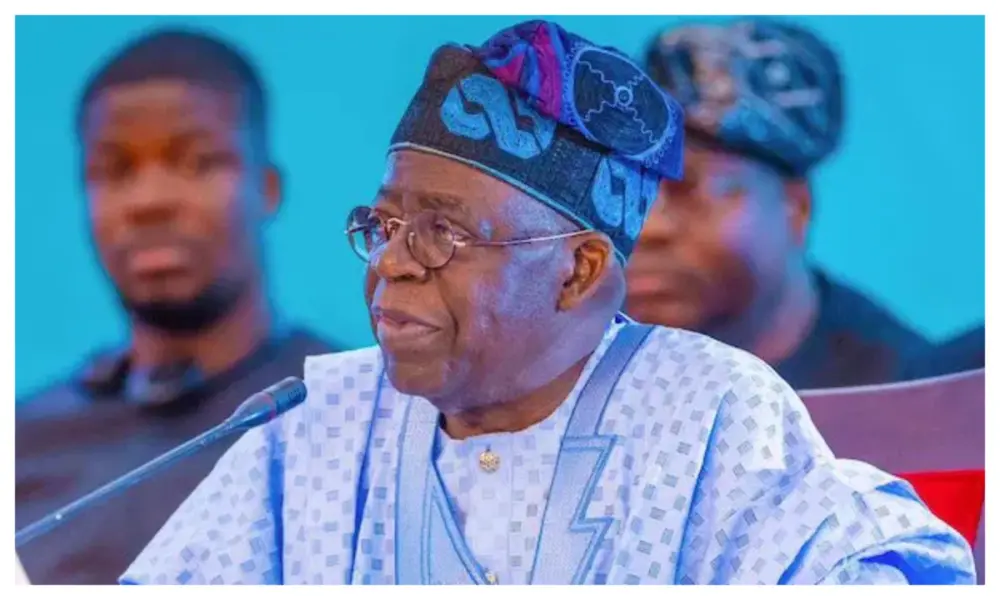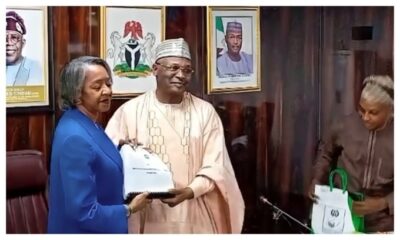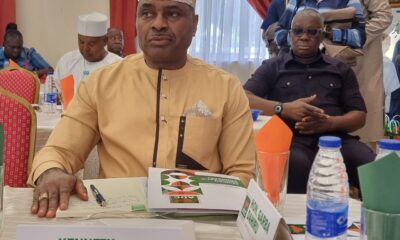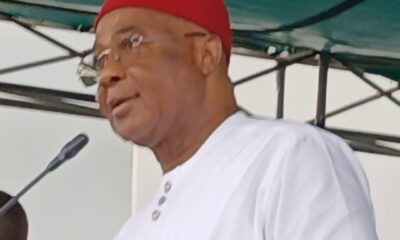Business
Tinubu, Cement manufacturers agree on N7,000 to N8,000 for 50kg per bag
…to review agreement in 30 days
…manufacturers blame forex crisis, bad roads, smuggling for increase
Federal Government of Nigeria and Cement Manufacturers have agreed on a N7,000 to N8,000 per 50 kg bag of cement to halt the astronomical rise in the price of the product.
This agreement was part of a deal struck after several hours of meeting held behind closed doors at the Headquarters of the Ministry of Works, between the Federal Government and cement manufacturers , in Abuja, on Monday.
The manufacturers tentatively agreed to sell a 50kg bag of cement at a retail price between N7,000 and N8,000, depending on location nationwide,
They however put a caveat that the price drop from the current market price would largely depend on government fulfilling its promised interventions in certain areas of concern to ameliorate critical challenges faced in the industry.
Retail price for cement jumped from N5,000 to N10,000 within one week in the open market, after wholesalers citing increasing cost of transportation and other variables, made adjustments to the price they sell to retailers.
Retailers in turn transferred the additional cost burden to consumers to stay afloat.
This prompted President Bola Tinubu to order the Ministers of Works, David Umahi and his Trade and Investment counterpart, Dr. Doris Uzoka-Anite. to meet with Cement manufacturers to find a solution to the crisis.
Umahi, had while calling for the meeting expressed the Federal Government’s concern over the development adding that if the situation wasn’t brought under control, it had the potential of hurting the prosperity agenda of rhe current administration .
After the meeting, Umahi read out a communique in which he mentioned concerns raised by the manufacturers.
These concerns include: bad roads, smuggling, high cost of energy, and the Forex crisis. This according to the manufacturers were the primary reasons behind the price hike.
He also said the manufacturers expressed willingness to reduce the prices going forward.
Manufacturers at the meeting include: Dangote Cement PLC, BuA Cement PLC, Larfarge Africa PLC and Cement Producers Association.
Reapresentatoves of the Federal Government include: The Minister of Works and his counterpart in the Ministry of Industry, Trade and Investment,
While reading the communique, Umahi said, “The meeting noted the challenges of the manufacturers like: Cost of gas;, High import duty on spare parts; Bad road network; High foreign exchange; and Smuggling of cement to neighbouring nations.
“The government noted the challenges and reacted as follows: Federal Ministry of Industry, Trade and Investment to seek some remedies from Mr. President on cost of gas and import duties.
“Federal Ministry of Works to give more attention to fixing of the roads, especially around the locations of the manufacturers.
On the issue of smuggling cement, the Federal Ministry of Industry, Trade and Investment to deepen the already started engagement with the National Security Adviser on how to stop the smuggling.
“The cement manufacturers and the Government noted that the current high price of cement is abnormal in some locations nationwide. Ideally, cement retail prices should not cost more than ₦7,000.00 to ₦8,000.00/ 50kg bag of cement.
“Therefore, the three cement manufacturers: Dangote Cement Plc, BUA Cement Plc and Larfarge Africa Plc have agreed that cement cost will not be more than between ₦7,000.00 and ₦8,000.00/50kg bag depending on the location.
“Going forward, Government advised cement manufacturers to set up a price monitoring mechanism to ensure compliance, and manufacturers have willingly accepted to do so and to sanction any of her distributors or retailers found wanting.
“Government expects the agreed price to drop after securing government’s interventions on the challenges of the manufacturers on gas, import duty, smuggling, and better road network.
“The meeting agreed to reconvene in 30 days to review progress made.”
Business
Subject: A cashier at a Kingsway store.

Location: Lagos, Nigeria.
Date: Circa January 1962.
Photographer/Source: Pix/Michael Ochs Archives.
Significance: The image captures the era of Kingsway Stores, which symbolized modern and cosmopolitan life in West Africa in the early 1960s.
About Kingsway Stores
Origins: The chain began as Lever’s Stores in 1922, evolving through Opobo Stores Ltd before becoming Kingsway Stores Ltd in 1947.
Expansion: The first store in Nigeria opened in Lagos in 1948, followed by others in cities like Freetown, Accra, Ibadan, and Port Harcourt.
Impact: Kingsway Stores represented a modern, western-style shopping experience, with departments for various goods, and were a popular shopping destination for Nigerians.
Business
TINUBU TO UNVEIL $400M INDIGENOUS CRUDE OIL TERMINAL IN ANDONI, RIVERS STATE.

President Bola Tinubu is scheduled to commission the $400m Otakikpo Onshore Crude Oil Export Terminal in Rivers State on October 8, the first new crude export facility to be built in Nigeria in over 50 years.
The facility, developed by Green Energy International Limited, operators of the Otakikpo field in OML 11, Ikuru town, Andoni Local Government Area of Rivers State, is the first wholly indigenous onshore terminal built in Nigeria. The last such facility, the Forcados Terminal, was commissioned in 1971.
The inauguration is expected to attract top government officials, including the Minister of State for Petroleum (Oil), Senator Heineken Lokpobiri, Rivers State Governor, Siminalayi Fubara, and key stakeholders across the oil and gas sector.
The Otakikpo terminal is expected to serve as a lifeline to more than 40 stranded oil fields by providing a reliable evacuation outlet, potentially unlocking millions of barrels of crude previously trapped underground.
With an initial storage capacity of 750,000 barrels, expandable to three million barrels, and a loading capacity of 360,000 barrels per day, the facility is also projected to reduce production costs for indigenous producers significantly.
Chairman and Chief Executive of GEIL, Professor Anthony Adegbulugbe, described the terminal as a “game-changing national infrastructure.”
“What we have achieved here is not just a storage solution, but a pathway for about 40 stranded oil fields to finally contribute to the economy,” Adegbulugbe said.
The commissioning underscores the Federal Government’s renewed efforts to restore investor confidence in Nigeria’s oil sector, which has struggled with declining production, pipeline vandalism, oil theft, and rising operational costs in recent years.
Business
Ndume calls for labour law review after PENGASSAN-Dangote refinery dispute

Senator Ali Ndume has asked the National Assembly to review Nigeria’s labour laws after the recent strike by oil and gas workers in protest of Dangote Refinery’s actions.
Speaking to the BBC Hausa Service, Ndume said the three-day strike made life harder for ordinary Nigerians until the Federal Government stepped in to settle the dispute.
“The strike brought unnecessary suffering. The price of petrol rose from ₦890 to ₦900, and people were left struggling. We need to review the labour law and make changes,” he emphasized.
The strike started after PENGASSAN protested the sack of hundred of workers at the refinery which Dangote Refinery insists was part of restructuring to meet its work needs and not because of union activity.
The strike, which began on Monday, September 28, was called off on Wednesday, October 1, after the government intervened. However, the Nigerian National Petroleum Company Limited (NNPCL) said the action reduced crude oil production by 16 percent and caused a 30 percent drop in gas trading.
Ndume argued that while workers’ unions deserve protection, they must not use their power to make Nigerians suffer.“If PENGASSAN felt the refinery treated its members unfairly, it should have gone to court, not cut off fuel supply,” he said.
He also reminded Nigerians that the Dangote Refinery is a private business built with billions of dollars, warning that unions must act responsibly when dealing with it.
-

 Politics12 months ago
Politics12 months agoMexico’s new president causes concern just weeks before the US elections
-
Business12 months ago
US court acquits Air Peace boss, slams Mayfield $4000 fine
-

 Trending12 months ago
Trending12 months agoNYA demands release of ‘abducted’ Imo chairman, preaches good governance
-
Entertainment12 months ago
Bobrisky falls ill in police custody, rushed to hospital
-
Entertainment12 months ago
Bobrisky transferred from Immigration to FCID, spends night behind bars
-

 Politics12 months ago
Politics12 months agoRussia bans imports of agro-products from Kazakhstan after refusal to join BRICS
-

 Politics12 months ago
Politics12 months agoPutin invites 20 world leaders
-
Education1 year ago
GOVERNOR FUBARA APPOINTS COUNCIL MEMBERS FOR KEN SARO-WIWA POLYTECHNIC BORI













